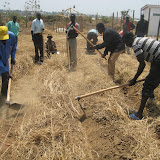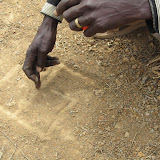Farming God's Way (FGW) Moves Forward
Small steps forward for this method of conservation agriculture in which soil fertility and scarce water is kept and increased both by not plowing and by covering the ground with a layer of mulch; and by adding natural fertilizers like composted grass and manure. FGW incorporates principles from observing Creation and from the Bible that works well to teach these methods in the villages of south Sudan. I held a workshop February 16 for 19 UM pastors and assistant pastors (I expected 10!) to introduce them to FGW; as a result, so far two pastors (from Logo and Mirodu villages) reporting to me that they have prepared a sample plot using these methods and are ready for me to supply them with maize (corn) seed so they can try it out! This makes me very happy. As of today I am proud to announce that Eden Teaching Farm of the Sudan District has officially begun what the new UN report on agroecology (conservation agriculture) calls "decentralized participatory research."
Not only that, but these methods may help Darfur in the north of Sudan. I've had a couple detailed email exchanges with a colleague in Darfur who hopes to use these methods there, and have tried to help her figure out how to adapt the the FGW methods to that area which has drier climate and scarcer resources than we in the south. I'm eager to see what may work there.
Steps forward on the global scene too: I've just discovered a new UN report (December 2010) advocating strongly for increasing the practice and scale of agroecology to increase food security and help small farmers worldwide; and a decision by the Food and Agriculture Organization (FAO) of the U.N. in June 2010 to promote this "integrated holistic approach" for sustainable crop intensification. They even mention the importance of "learning by doing" and of partnering with non-governmental groups at the local level. So far the farming methods we are beginning here is not yet widely accepted or practiced in Sudan, but this tells me it will be promoted more and more. I'm encouraged in my work and thankful to be helping the villages and churches we work with to be involved at the beginning of an important movement.
Steps Forward in Development Hearts and Minds, too
We (mostly Diantha due to my limited mobility on motorcycles) have now completed basic strategic planning meetings in 13out of 17 villages, a process we began last September. We had no idea it would take so long! But we're excited by what's happening. We invite each church to choose an initial project that must meet 4 criteria: (1) It must address a top priority identified by the village during the planning meeting (2) It must involve investment by the village of labor, materials, or both (3) It must require no more than US $150 from us (4) It must be able to be started soon and completed in 4 months or less, so that the church and village have an immediate sense of succeeding in the long path to development. The results are interesting: Three churches have chosen an initial project in agricultural training because they reason that increased production will mean they have more food not only to eat but to sell to get money for school fees, medicines, and other crucial needs. Seven churches have chosen to build an additional school "building" (simply a thatched roof) so they can move more classes from under the trees and expand the number of village children who can be educated (for many of these children the church school is their only option as they cannot afford the higher fees of the government schools, which also may be too far away to walk to). And one church has chosen to build latrines so that their school children can improve their health. One church wants help to get culverts in the road to make it passable in the rainy season and allow their children to walk to school even in the rainy season. The reasoning behind their choices are gratifying. So are, increasingly, the comments made during the planning process. We always ask early on in the meeting for a list of things people are thankful for, as well as (inevitably) a list of what they need. During the first planning meetings last fall, the lists were predictable: they were thankful for their church and the local school the church had begun, the seeds and tools they have been given, the bore hole (deep well) dug with funds from US churches. But since the Referendum in January, the list of thanksgivings have been changing and deepening. We hear thanks for the Referendum, thanks for freedom and peace; and we often hear thanks for the improved life of women. Women are thankful for liberation from the fear that a harsh version of sharia (islamic) law could be imposed on them; thankful that the new government is making a commitment to the rights of women including making women 50% of all government leaders; thankful for a focus on decreasing gender based violence. While the villages and the churches, like the towns and the government, still have a long way to go to put all these changes into practice, its great to hear the excitement and hope in these comments. We feel privileged to be here, doing this, at this time.
Saturday, April 2, 2011
Mission in South Sudan: April 1, 2011
Labels:
agriculture,
agroecology,
conservation,
development,
farming God's way,
Sudan,
team,
village
Subscribe to:
Post Comments (Atom)
















Thanks, Steve and Diantha, not only for engaging in this vital mission but also for sharing it with others.
ReplyDeleteJim Gulley
Thanks, Jim! Coming from you, that means a whole lot. We appreciate encouragement from someone with your depth and breadth of experience, while starting mission work that is sometimes painstakingly slow and sometimes seems strange to everyone here but us.
ReplyDeleteWonderful news! It is especially encouraging to me to read of the thankfulness around women's rights; it's a pet-project of mine, as you know. Great work is happening in Southern Sudan!
ReplyDeleteThanks, Amy! We too are excited about the progress in women's rights and their confident voice. We are seriously exploring how we can increase the amount of literacy for women as a component of our projects, since women have had even less opportunity than men to learn to read and use numbers.
ReplyDelete